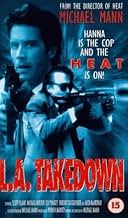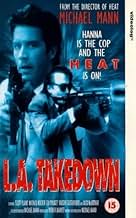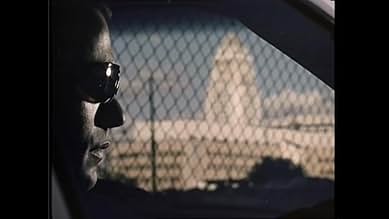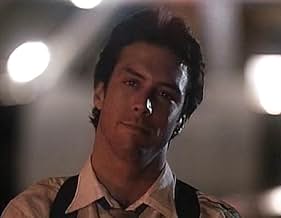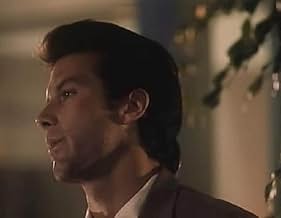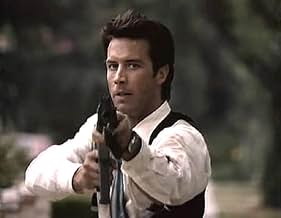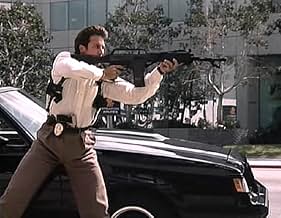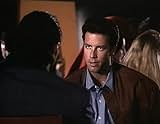IMDb-BEWERTUNG
6,0/10
2765
IHRE BEWERTUNG
Füge eine Handlung in deiner Sprache hinzuTough Los Angeles cop Vincent Hanna takes on a gang of professional bank robbers led by the precise, enigmatic Patrick McLaren.Tough Los Angeles cop Vincent Hanna takes on a gang of professional bank robbers led by the precise, enigmatic Patrick McLaren.Tough Los Angeles cop Vincent Hanna takes on a gang of professional bank robbers led by the precise, enigmatic Patrick McLaren.
Juan Fernández
- Harvey Torena
- (as Juan Fernandez)
Sam J. Jones
- Jimmy
- (as Sam Jones)
Empfohlene Bewertungen
It is great to see a low budget version of a great film. Michael Mann's 1995 masterpiece Heat was actually conceived way back in the 80s by the director Michael Mann. He decided to make it then with the limited budget he had. The scenes and even dialogues are verbatim but it is great to see what a bigger budget can get- from better thespians of the class of Pacino and Deniro to some amazing locations. This is a good film for film students to sit and analyze.
This movie has the same basic plot outline as Heat and MOST of the same characters, but is in NO WAY "scene-for-scene the same as Heat." The acting is absolutely atrocious and some of the scenes make no sense without some of the setup Heat has. I can understand why these actors haven't gone on to much beyond this movie -- THEY'RE AWFUL!!!!! Some of the storyline is just implausible and downright silly. I can also fully understand why this isn't available on DVD here in North America (the quality of this film is akin to what you might see on late night local television). However, if you're a die-hard Michael Mann fan, as am I, you should still see this, because it because it shows how much development he puts into a story.
L. A. TAKEDOWN is an extremely watchable film, and has a script that is permeated by a kind of grim intelligence. The characters, far from being plastic stereotypes, actually engage on a psychological level. Michael Mann directs with considerable skill, and most tellingly, knows how to use music to maximum effect. In this respect, his ability at times almost reaches the genius level of the Italian director Gillo Pontecorvo. But main honours in this film must go to Alex McArthur who gives an amazing performance of such skill and power that he actually conveys the very thoughts and feelings of his character through body language or facial expression. The scene where the two protagonists (the hoodlum and the cop) have coffee together is almost faultless in conveying the powerful emotions and tensions that are at work between them, as well as the mind-set which motivates each of the characters, and, for once, the various love scenes are convincing and important to the development of the narrative. Interestingly too, (although it perhaps happened by default since it was a film made for television), the actual violence that is a necessary part of the story is rendered perhaps even more powerfully by NOT being shown, or by happening off-camera. But to my mind, the film belongs to Alex McArthur who turns in one of the best acting performances I have seen in a very long time, which is able to make you both loathe and feel pity for his character at one and the same time. No mean feat!
Most people who see L.A. Takedown nowadays will see it for one reason: the fact that director Michael Mann remade this as Heat starring Robert DeNiro and Al Pacino in the Alex McArthur and Scott Plank roles. And that is basically the only reason why you would want to see this, unless you're an avid fan of '80 cop shows (there's even an detective-on-the-prowl-style montage).
When you watch this as I did (after seeing the brilliant Heat) you'll be pretty surprised by how much of L.A. Takedown went into Heat. From the opening heist to that famous coffeebar scene, a lot in both movies is identical, from characters to dialogue to camera angles. Most differences between both films are actually additions (which, of course, make Heat a good hour longer than L.A. Takedown). The Chris Shehirlis character (Val Kilmer in Heat) is basically an extra in L.A. Takedown as is the getaway driver for the bank robbery. Ah yes, the bank robbery. It's present here too, although of course, it doesn't last for nearly fifteen minutes (try three). Then whole subplots from Heat (for instance the one featuring Vincent Hanna's daughter) are absent and the ending is quite different, causing L.A. Takedown to lack the almost epic feel of Heat. Still, a lot of what is L.A. Takedown went on to become Heat.
And that's why L.A. Takedown merits viewing; to see how this film evolved from a cheaply made, averagely entertaining TV pilot show to what may just be the crime movie of the nineties. Many of the differences concerning the script I've already mentioned. The other main differences lie in acting and direction. To say that someone named Scott Plank (yes, plank) is not up there with Al Pacino is hardly surprising. But Plank is really pretty embarassing in this, coming across as someone who's copying crap TV-show acting like that from shows such as Hunter or Miami Vice. Even more embarassing is McArthur, who doesn't succeed in bringing any of his character's complexity to light (his character is actually pretty well developed in the script, which makes McArthur 'performance' even worseand it's the only character whose name was changed for Heat - don't ask me why). The rest of the cast isn't even worthy of comparison with their Heat counterparts.
As for directing, L.A. Takedown actually lookes pretty good, given that's it's a cheap TV movie. As said, some camerawork is very literally repeated in Heat (the opening heist is just one example), but L.A. Takedown is more coloured than Heat. Heat may be very stylised, the reality aspect of it was never looked over. In L.A. Takedown the stylism is present, but the realism takes a back seat, as dark streets and dim lights convey the traditional view of L.A. as a seedy place. But although the technical brilliance of Heat's cinematographer Dante Spinotti is clearly missed, L.A. takedown is visually not that bad.
In short: L.A. Takedown is not a good movie, and by itself not even remarkable. It is however a very interesting companion to Heat and both movies combined show that what you should remake is bad movies with unused potential, not good movies.
Rating: 4/10 (Heat: 9/10)
When you watch this as I did (after seeing the brilliant Heat) you'll be pretty surprised by how much of L.A. Takedown went into Heat. From the opening heist to that famous coffeebar scene, a lot in both movies is identical, from characters to dialogue to camera angles. Most differences between both films are actually additions (which, of course, make Heat a good hour longer than L.A. Takedown). The Chris Shehirlis character (Val Kilmer in Heat) is basically an extra in L.A. Takedown as is the getaway driver for the bank robbery. Ah yes, the bank robbery. It's present here too, although of course, it doesn't last for nearly fifteen minutes (try three). Then whole subplots from Heat (for instance the one featuring Vincent Hanna's daughter) are absent and the ending is quite different, causing L.A. Takedown to lack the almost epic feel of Heat. Still, a lot of what is L.A. Takedown went on to become Heat.
And that's why L.A. Takedown merits viewing; to see how this film evolved from a cheaply made, averagely entertaining TV pilot show to what may just be the crime movie of the nineties. Many of the differences concerning the script I've already mentioned. The other main differences lie in acting and direction. To say that someone named Scott Plank (yes, plank) is not up there with Al Pacino is hardly surprising. But Plank is really pretty embarassing in this, coming across as someone who's copying crap TV-show acting like that from shows such as Hunter or Miami Vice. Even more embarassing is McArthur, who doesn't succeed in bringing any of his character's complexity to light (his character is actually pretty well developed in the script, which makes McArthur 'performance' even worseand it's the only character whose name was changed for Heat - don't ask me why). The rest of the cast isn't even worthy of comparison with their Heat counterparts.
As for directing, L.A. Takedown actually lookes pretty good, given that's it's a cheap TV movie. As said, some camerawork is very literally repeated in Heat (the opening heist is just one example), but L.A. Takedown is more coloured than Heat. Heat may be very stylised, the reality aspect of it was never looked over. In L.A. Takedown the stylism is present, but the realism takes a back seat, as dark streets and dim lights convey the traditional view of L.A. as a seedy place. But although the technical brilliance of Heat's cinematographer Dante Spinotti is clearly missed, L.A. takedown is visually not that bad.
In short: L.A. Takedown is not a good movie, and by itself not even remarkable. It is however a very interesting companion to Heat and both movies combined show that what you should remake is bad movies with unused potential, not good movies.
Rating: 4/10 (Heat: 9/10)
If you're a fan of Heat and can engage with a movie in a certain kind of analytical or more distant way, I feel like L. A. Takedown is possible to recommend. If the idea of seeing a warm-up/dress rehearsal for Heat sounds interesting, L. A. Takedown is just that. It has many similarities when it comes to the main premise and the characters, though I think there were a couple of characters who only appeared in the nearly twice-as-long Heat, or were only in L. A. Takedown for a matter of seconds; not long enough to have them make an impact.
What's different is how much better the 1995 film looks and sounds, as well as how much better the acting is. There are a couple of good performances in L. A. Takedown, some that are passable by TV movie standards, and some that really aren't very good (my ears couldn't believe some of the line deliveries here and there).
The ending is also so much better in Heat, and maybe the one narrative element that's significantly different. Other sequences are almost identical; maybe a little shortened, given L. A. Takedown is only 90-ish minutes long. Seeing the rough proof-of-concept of one the best crime epics of all time is absolutely fascinating, it has to be said, and though L. A. Takedown isn't super high-quality and certainly has numerous shortcomings, I think it's surprisingly engaging when approached from this specific angle. Also, as far as TV movies from the 1980s go, I've definitely seen some that are choppier and more amateurish.
Also pleased to announce that like Heat, the big bank robbery/shootout is the highlight of L. A. Takedown - it's a cut above most of the other scenes in the film, with how it's shot and assembled, and proves surprisingly thrilling.
What's different is how much better the 1995 film looks and sounds, as well as how much better the acting is. There are a couple of good performances in L. A. Takedown, some that are passable by TV movie standards, and some that really aren't very good (my ears couldn't believe some of the line deliveries here and there).
The ending is also so much better in Heat, and maybe the one narrative element that's significantly different. Other sequences are almost identical; maybe a little shortened, given L. A. Takedown is only 90-ish minutes long. Seeing the rough proof-of-concept of one the best crime epics of all time is absolutely fascinating, it has to be said, and though L. A. Takedown isn't super high-quality and certainly has numerous shortcomings, I think it's surprisingly engaging when approached from this specific angle. Also, as far as TV movies from the 1980s go, I've definitely seen some that are choppier and more amateurish.
Also pleased to announce that like Heat, the big bank robbery/shootout is the highlight of L. A. Takedown - it's a cut above most of the other scenes in the film, with how it's shot and assembled, and proves surprisingly thrilling.
Wusstest du schon
- WissenswertesHeat (1995) had 6 months of pre-production, and a 117 day shooting schedule. Showdown in L.A. (1989) had 10 days of pre-production, and a 19 day shooting schedule. Michael Mann said that comparing one film to the other is like comparing "freeze dried coffee" to "Jamaican Blue Mountain".
- PatzerIn the exterior, after the bar scene when Hanna is following Lillian on the sidewalk, the boom mic shadow is frequently seen chasing above/behind the quarreling actors.
- Zitate
Detective Arriaga: [into phone/greeting] Raymond, you "Degenerate". Goodmorning.
Detective Arriaga: [louder] Raymond, wakeup!
Top-Auswahl
Melde dich zum Bewerten an und greife auf die Watchlist für personalisierte Empfehlungen zu.
Details
Zu dieser Seite beitragen
Bearbeitung vorschlagen oder fehlenden Inhalt hinzufügen

Oberste Lücke
By what name was Showdown in L.A. (1989) officially released in Canada in English?
Antwort
